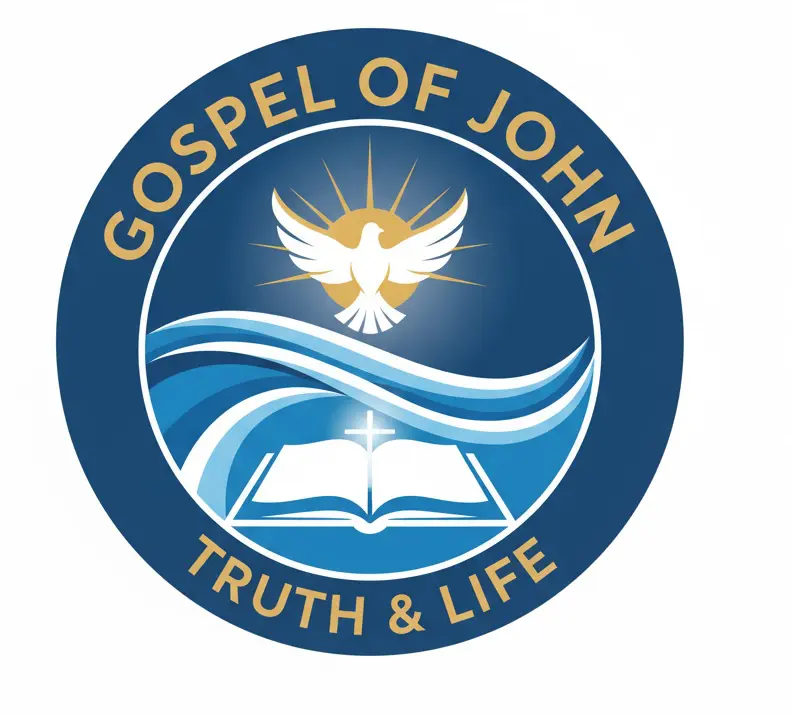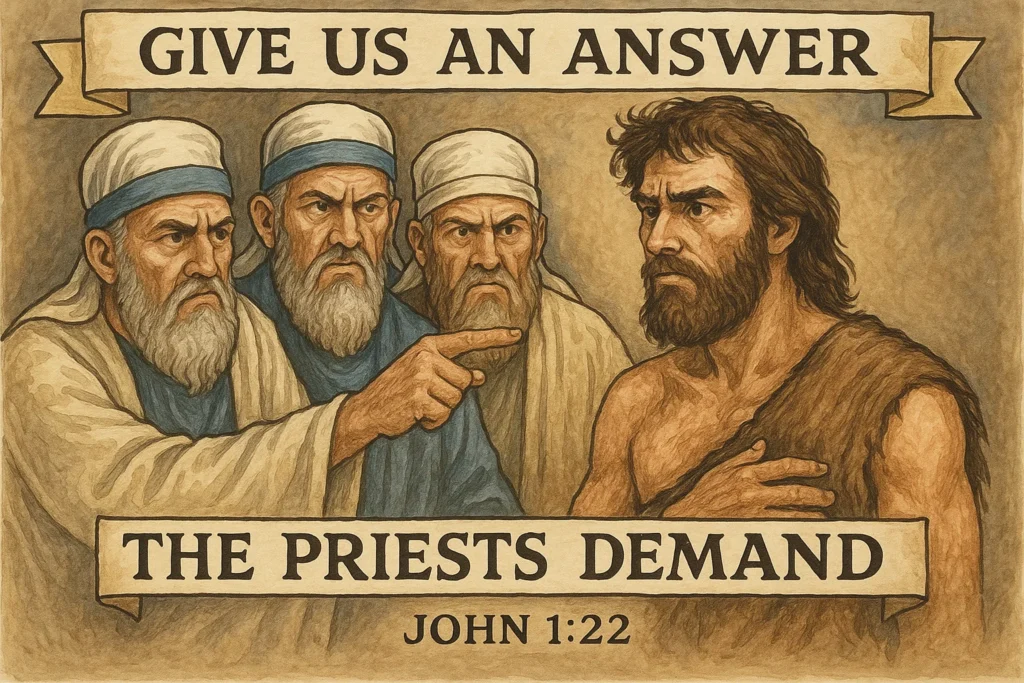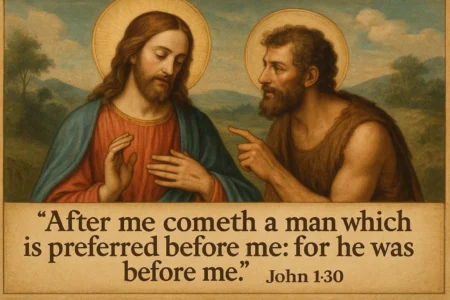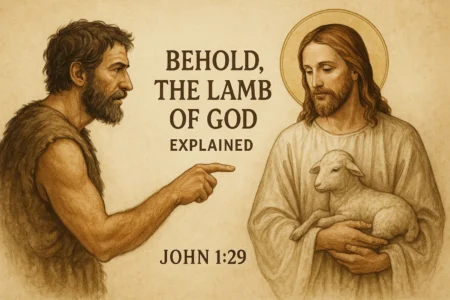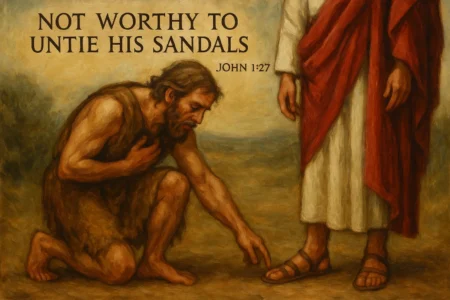You can feel the tension, can’t you? It’s that awful, thick silence right before a storm breaks. Imagine a group of important men, robes and all, faces like stone. They’ve marched from the comfort of Jerusalem straight into the wild, dusty wilderness. This isn’t a social call. They want an answer. And they’re not leaving without one. This showdown, right in John 1:22, is so much more than a line in an old book. It’s a theological collision. This John 1:22 Commentary isn’t just about history; it’s about identity, power, and what happens when the old guard smacks right into something new, something… wild.
“Then they said to him, ‘Who are you? We need an answer for those who sent us. What do you say about yourself?'” (John 1:22, ESV).
That right there? That’s patience snapping. It’s the sound of men who are way out of their comfort zone, feeling the heat from their bosses, and looking at a guy they just can’t figure out. This man, John the Baptist, is a total phenomenon. A wild man. He’s eating bugs and honey, wearing camel’s hair, and—worst of all—he’s pulling their crowds from their city out to this muddy river. He’s a problem. A big one. And they have to know who he thinks he is.
More in John Chapter 1 Category
Key Takeaways
Before we dive deep into the dust and drama of this desert interrogation, here are the essential truths we’ll uncover:
- This wasn’t a friendly chat. It was a hostile interrogation. The bigwigs (the Sanhedrin) sent them to see if John was a theological or political threat.
- That line, “Give us an answer,” screams “we’re in trouble.” These guys were middle-managers who had to bring something back to their bosses.
- John’s identity is all about who he isn’t. He had to say “I’m not the Christ” to clear the stage for Jesus.
- His real answer—”I am the voice”—is brilliant. He’s not a title; he’s a job, one straight from the scriptures (Isaiah 40:3).
- The real fight was about authority. The Pharisees’ later question (v. 25) is basically: “Who gave you permission to baptize?”
- John’s whole point was to point away from himself. He was the warm-up act, there to “make straight the way of the Lord.”
What’s the Real Story Behind This Wilderness Confrontation?
You have to get the picture. This is no quiet study. The air is buzzing. The Jordan River is just… there. Muddy, constant. For weeks, maybe months, this preacher, John, has been the only thing anyone in Judea is talking about. His message is brutal: “Repent, for the kingdom of heaven is at hand!” And people are actually doing it. Freely confessing their sins and letting this guy dunk them in a river. This man who answers to nobody.
That’s a massive problem.
The whole religious world of first-century Judea was a system. A carefully protected one. The Sadducees? They ran the Temple and kept the Romans happy. The Pharisees? They ran the synagogues and the local law. Everyone knew their place.
John didn’t have a place.
He was a total outsider. No rabbinical degree. Not part of the Temple crew (even though he was born a priest’s son). He was a rogue agent, and he was wildly popular. That, of course, made him a threat to the men in charge.
Who Sent This Interrogation Squad, Anyway?
Verse 19 says “the Jews sent priests and Levites from Jerusalem” to ask him who he was. We need to be clear about “the Jews.” In John’s Gospel, that’s often code for the top religious brass in Jerusalem, the Sanhedrin. Think of it as the supreme court and governing council, all in one.
So, this isn’t some low-level group. They come with the full authority of the most powerful body in the land. The priests are the Temple establishment. The Levites are their staff. These are the “company men.”
They get there, and the questioning starts. “Who are you?” John is blunt. He “confessed, and did not deny, but confessed, ‘I am not the Christ'” (v. 20). You can almost see them blink. That’s the biggest title. Why just… deny it? They regroup. “What then? Are you Elijah?” (v. 21). “I am not.” “Are you the Prophet?” “No.”
Now we’re at verse 22. The delegation is getting ticked off. They’ve come a long way just to get a string of “nos.” “I’m not this. I’m not that.”
“Give Us an Answer!” – Why Were They So Incredibly Demanding?
Their frustration just explodes. “Who are you? We need an answer for those who sent us. What do you say about yourself?”
That’s the key. “We need an answer for those who sent us.”
These guys are on a mission. They have to march back into those marble halls and file a report. Can you imagine their bosses, men like Annas and Caiaphas, staring them down? “Well? Who is he? Is he the Messiah? A nutcase? A threat?” If they go back with, “Uh… he just told us who he isn’t,” they’d be humiliated. Their careers would be shot.
This isn’t theology for them. It’s a job.
I remember a time in a past corporate career, long before I entered ministry and writing, when I was pulled into a high-level board meeting. My department had launched a project that was getting unexpected, massive public attention, much like John’s ministry. My boss’s boss, a man I rarely ever saw, started grilling me. “What’s the status? What are the projections? Who authorized this?” I quickly realized he wasn’t really asking me for information. He was gathering his ammunition. He had to report to the CEO and the shareholders. He needed an answer to cover himself.
That’s the exact energy I read in John 1:22. This is the sound of middle-managers in way over their heads. “Please, just give us a label. Give us a box to put you in. We just want to go home.”
Their demand is blunt. Their need is simple. CYA. Cover your assets.
Weren’t They Just Curious? Or Was It Something More Sinister?
It’s nice to think they were just curious. Maybe even hopeful. “Could this be him?” But their later questions give them away. This was less about hope and more about control.
Their motives were a total mess, all tangled up:
- Guarding Doctrine: They saw themselves as the guardians of truth. Was this guy a heretic? Was he falsely claiming to be one of the “big three” (Messiah, Elijah, the Prophet)? They had a duty to find out.
- Keeping the Peace: Any guy attracting huge crowds and talking about a “kingdom” was a huge red flag for the Romans. A messianic revolt was the governor’s #1 nightmare. If that happened, the Sanhedrin would be the first ones blamed.
- Protecting Their Turf: John was operating without their sign-off. He was a rogue. He hadn’t gone through their channels. He was undermining their authority just by existing and being good at it.
So, no. Not a friendly chat. This was a cross-examination. They weren’t just curious. They were running an investigation to see if John was a heretic, a rebel, or just a really popular pain in the neck.
John Finally Answers… But Not How They Expect, Right?
After they vent in verse 22, John finally gives them a “yes” answer. And it’s a brilliant one. It’s both incredibly humble and totally monumental.
“He said, ‘I am the voice of one crying out in the wilderness, “Make straight the way of the Lord,” as the prophet Isaiah said.'” (John 1:23).
This is just… genius. Look at what he does.
He doesn’t give them a title. He doesn’t say, “I’m a prophet” or “I’m a teacher.” He gives them a function. “I am the voice.” He boils his entire identity down to a sound, a message. He’s not the star; he’s the announcement for the star.
Then, he immediately anchors that function in Scripture. “As the prophet Isaiah said.” This is a killer move. He’s telling these Bible experts, “You want to know who I am? Read your own book. I’m Isaiah 40:3. My authority doesn’t come from you. It comes from this prophecy.”
That puts them in a terrible spot. They can’t just write him off as a crazy person, because he just quoted one of their heroes. Now they’re the ones who have to argue with Isaiah. He completely flipped the script.
What Did “The Voice in the Wilderness” Mean to Them?
When John dropped that Isaiah 40:3 quote, every priest and Levite there knew exactly what he was talking about. It wasn’t some deep cut. It’s from one of the most powerful parts of Isaiah, promising the end of exile and the glorious return of God Himself to His people.
The “voice” in that prophecy was the herald. The guy sent ahead to clear the road, to build a highway for the King.
By claiming this, John was saying some explosive things:
- “You’re all still in exile.” (Not exactly a popular opinion!) “You might be back in the land, but spiritually? You’re still in Babylon.”
- “God Himself is about to show up.” This isn’t just another prophet. This is the big one. The King is on his way.
- “My whole job is to get you ready for Him.”
So, while “I am the voice” sounds humble—and it is—the implication is world-changing. He’s calling the end of an era. He’s announcing God is about to step in. No wonder they were floored.
What Does This Confrontation Teach Us About Identity?
This whole fight is a lesson in identity. The delegation was obsessed with labels. “Are you this? Are you that? Give us a title! Put it on your name badge!”
John won’t play.
His identity isn’t a title. It’s not what people think of him. It’s not his follower count. John’s identity is his mission. He knows why he’s here.
When you know your “why,” you don’t get as hung up on the world’s “who.”
I’ve struggled with this my whole life. When I first felt a call to write and teach, people were quick to try and label me. “Oh, so you’re a pastor?” “You’re a blogger?” “You’re a theologian?” “You’re just a hobbyist?” None of those felt right. Like John, I had to learn to stop worrying about the titles and just focus on the function. I had to learn to say, “I am a man who loves to make complex ideas simple and clear. I am a voice trying to help people connect with God.”
John’s answer is just a masterclass in this. He didn’t care about the shiny labels “Christ” or “Elijah.” He just cared about being “the voice.” He knew his lane. He stayed in it. And that gave him a rock-solid confidence that this powerful committee from Jerusalem couldn’t even dent.
How Did the Pharisees React to All This?
But the story doesn’t end there. Verse 24 adds a little detail: “Now they had been sent from the Pharisees.”
This is a key piece of the puzzle. The first group was priests and Levites (mostly Sadducees, the political types). This new detail suggests either a second group or that the Pharisees were backing the whole thing. The Pharisees were the other power center—the ultra-strict, legal-minded party, obsessed with the details of the law.
And their next question shows exactly what they’re really mad about.
“Then why are you baptizing, if you are neither the Christ, nor Elijah, nor the Prophet?” (John 1:25).
There it is. The real complaint.
They’re basically saying, “Okay, fine. You’re ‘the voice.’ Whatever. But if you aren’t one of the three guys who might, might, have the authority to start a new religious ritual… who do you think you are to be baptizing people?”
To them, this was a total breach of protocol. Baptism (ritual washing) was for two things: cleansing from a major impurity, or for a Gentile converting to Judaism.
By baptizing Jews, John was making a radical, offensive point. He was saying the chosen people of God were as unclean as pagans and needed to “convert” all over again to be ready for the kingdom. This was a direct shot at the Pharisees’ entire system, which was built on the idea that following the Law was what made you right with God.
John’s baptism wasn’t just a symbol. It was a theological slap in the face.
What’s the Big Takeaway from John’s Final Answer in This Scene?
John’s answer to this challenge is his last and most important one in the whole conversation. He doesn’t defend his resume. He doesn’t argue about credentials. He just pivots.
He points.
“I baptize with water, but among you stands one you do not know, even he who comes after me, the strap of whose sandal I am not worthy to untie.” (John 1:26-27).
That’s the mic drop. He guts their whole argument by doing three things:
- He downplays his own gig: “I baptize with water…” He’s saying, “This thing you’re so upset about? My baptism? It’s just water. It’s the opening act, not the headliner.”
- He points to the ‘Other’: “…but among you stands one you do not know.” What a chilling line. He’s telling the religious pros of Israel that the one they’ve been waiting for is already here, and they’re blind to him.
- He declares his own unworthiness: “…the strap of whose sandal I am not worthy to untie.” This was a slave’s job. The lowest of the low. John, this massively popular preacher, puts himself infinitely beneath this “one who comes after.”
He answers their demand for his authority by pointing to the supreme authority of Jesus.
Why Is This John 1:22 Commentary So Crucial for Us Today?
So why does this 2,000-year-old argument in the desert matter? Because the pressure to “give an answer” about who we are is everywhere.
Our world, just like that Sanhedrin delegation, demands labels. Are you a success? A failure? What’s your job title? Your follower count? We’re constantly being grilled by our culture, by social media, by our own doubts, all demanding, “Who are you?”
This John 1:22 Commentary shows us a different, more freeing path.
John’s example is all about humility. He was maybe the most famous man in the country at that moment, and he used his entire platform to make himself smaller so Christ could look larger.
It also teaches courage. John stood toe-to-toe with a panel of powerful men who could (and later did) have him killed. He didn’t backpedal. He didn’t water down his message. He spoke his truth, because he was rooted in his mission.
And it teaches focus. John knew his job. He was a voice. A signpost. A witness. His whole life was one big arrow pointing away from himself and toward Jesus.
How Does This Passage Set Up the Rest of John’s Gospel?
This whole confrontation is the perfect runway for the rest of John’s Gospel. It does a few critical things.
It locks in John the Baptist’s main role: he is the witness. “Witness” is a massive word in this Gospel. And here, John gives his first official testimony, not to a cheering crowd, but to a hostile court.
It also sets up the central conflict of the whole book. The religious authorities (“the Jews”) are, from moment one, positioned as the opposition. They’re in the dark (“one you do not know”) and they’re already fighting the new thing God is doing.
And it clears away all the wrong assumptions. Before we even meet Jesus in this Gospel, the most credible guy on the scene has gone on record: “I am NOT the Messiah.” That settles that.
This interrogation is like a formal “passing of the torch.” The very next day, the tension breaks. The questions stop. The proclamation starts. John, having given his “answer,” now sees Jesus and gives his real answer:
“Behold, the Lamb of God, who takes away the sin of the world!” (John 1:29).
The interrogation is over. The mission begins. This idea of testimony is what the Christian faith is built on. The Bible itself is a collection of testimonies. Scholars, like those at Harvard University’s Divinity School, often dig into the historical and literary nature of these claims, which form the very bedrock of belief.
That demand, “Give us an answer,” was more than just a question. It was a challenge to God’s new move. The delegation came to the wilderness looking for a man they could label and control.
They found something else.
They found a voice. A witness. And in doing so, they stumbled right into the announcement of the King. John’s answer, rooted in purpose instead of ego, is a timeless model. When the world demands of us, “Who are you?” our best answer isn’t one that points to our own titles. It’s one that, like John’s, points to the One who came after, the One whose sandals none of us are worthy to untie.
FAQ
Why did the religious leaders challenge John the Baptist in John 1:22?
The leaders challenged John because he was attracting large crowds, operating outside their authority, and preaching a message that threatened their religious and political systems. They wanted to label him and understand his role to control or discredit him.
What is the deeper meaning behind John calling himself ‘the voice’ in Isaiah 40:3?
By calling himself ‘the voice,’ John signifies his role as a herald preparing the people for God’s arrival. It highlights humility and obedience to God’s prophetic fulfillment, pointing away from himself and toward Jesus.
Why is John’s answer in John 1:26-27, about not being worthy to unty the sandal strap, so significant?
John’s statement emphasizes his humility and recognizes Jesus’ supreme authority. It underscores that John’s role is minor compared to Jesus, whom he describes as the one they do not know but who is coming after him, signaling the importance of divine authority over human titles.
